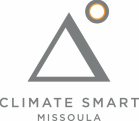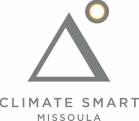|
Like you, we've seen the stunning, heartbreaking footage of unprecedented flooding across communities in Southwest Montana this week, which has caused severe damage, stranded residents and visitors, and disrupted lives and livelihoods.
The sharp jump in water levels along the Yellowstone and other rivers was caused by a rain-on-snow event, as a sequence of cool temps, snow, and rain combined with spring snowmelt to inundate waterways. Climate has to do with patterns over time, so it can take a lot of data to establish a particular weather event or disaster was caused by the climate crisis. But there's no doubt that the fingerprints of the climate crisis are all over this flooding. Excess heat in Earth's climate system is disrupting weather patterns and the water cycle, causing greater variability of precipitation and earlier snowmelt (the 2017 Montana Climate Assessment's chapter on water has a good summary of water-related climate impacts we can expect to see more of). Even as I write this, there's a gap between my desire to describe and make sense of what's happening, and the emotions it stirs up. For all its value, the cautious, nuanced language of science often feels so inadequate in the face of the raw and painful human and ecological costs of climate disasters. Already this year, we've seen severe drought plaguing much of eastern Montana, widespread heatwaves in the Southwest and Southeast U.S., and wildfires across the West. And it's only June. So, how can we respond? Here are some suggestions, and as always, we'd love to hear your ideas and thoughts too - just hit reply to this email. Help those impacted. We're aware of several relief funds that have been established to support Montana communities recovering from flooding; do contribute if you're able. Talk about the climate crisis. It's critical that we connect what's happening around us with the climate crisis. A warming climate loads the dice, increasing the odds of these kinds of once-infrequent (or unprecedented) disasters happening. The more we can help friends, family and colleagues understand that the climate crisis is not some future possibility but is here now, the more we can grow the movement for urgent action to avoid the worst impacts. Do offer suggestions for being part of solutions, too; this can help avoid getting stuck in feelings of anxiety or overwhelm. Resolve to stay engaged, and take care of yourself. News and images of destruction can be hard to take in (and that much harder for those who have personal connections to places that are impacted). And it's not as if the world otherwise is hunky dory! An epidemic of gun violence, racism and hate crimes, housing and economic precariousness, threats to our democracy...there's plenty to be worried about, and it can feel overwhelming. Take the time you need to grieve losses, reconnect with people and the natural world, and then re-commit to staying engaged in the movement for building a livable future, starting right here in Missoula. Seek out signs of forward movement. Looking for good news - and it does exist! - can help remind us that the work of building a more resilient, climate-safe world is underway, and can inspire us to keep doing our part. Here are a few pieces of climate progress you may have missed recently:
-Abby
0 Comments
Leave a Reply. |
AuthorsAbby Huseth Archives
July 2024
Categories
All
|

 RSS Feed
RSS Feed


